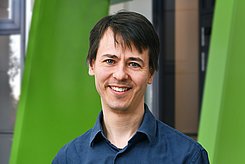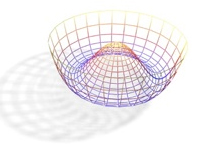
Borsányi, Szabolcs
Professor für Theoretische Physik

The aim of theoretical elementary particle physics is to create a mathematical model of the fundamental components of the universe and their interactions that is as simple as possible, yet as close to reality as possible. It is very important to understand the consequences of such a model in detail in order to make experimentally testable predictions. These can be calculations of cross-sections for accelerator experiments or, and this is the focus at the University of Wuppertal, the clarification of fundamental questions such as:
- What is the mass of protons and neutrons and how are they structured?
- What other “hadrons” does the standard model predict? Are there any exotic ones, such as glueballs, tetraquarks or hybrids?
- What magnetic field does a muon have?
- How strong are the strong nuclear forces?
- What strange phases can matter take on, and what role did this play in the early universe?
Many such questions can only be answered adequately by numerically evaluating strongly coupled quantum field theories on supercomputers. From the mathematical formulation, the development of suitable algorithms and their efficient efficient implementation and state-of-the-art data analysis, numerous interesting interesting fields of mathematics, computer science and physics are being worked on by the physics are being worked on by the resident research groups.
The research group of Prof. Knechtli deals with simulations of the theory of strong interaction, quantum chromodynamics (QCD) on the lattice. In particular, novel algorithms are developed in the framework of the DFG research group "Future Methods for Studies of Trapped Gluons in QCD (FOR 5269)" (https://confluence.desy.de/display/for5269).(https://confluence.desy.de/display/for5269). The interests of the group are the physics of charmonium, glueballs and hybrid mesons, the static potential and the calculation of the strong coupling constant. Besides QCD, gauge theories in 5 dimensions and spin models are studied using Monte Carlo simulations.
Christian Hölbling’s main area of interest is the numerical treatment of quantum field theories. This includes phenomenological calculations in lattice QCD, with the general aim of testing the Standard Model’s internal consistency and the search for new physics. Besides this main line of research, Christian is interested in conceptual and algorithmic aspects of discretized quantum field theories, such as chiral and other symmetries and the construction of improved lattice actions. His third research focus is in semiclassical gravitation, in particular the numerical treatment of black hole formation by quantum fields. Go to the website of Christian Hölbling here
Prof. Günther's research focus is the study of the QCD phase diagram using lattice gauge theory methods. In particular, she is concerned with the behavior of QCD matter at finite densities, which is a particular challenge for lattice QCD calculations. Here, the notorious "sign problem" prevents the use of the established Monte Carlo simulations, which is why new methods are sought or extrapolations are used to solve QCD in this domain. The knowledge gained in this way can be used to understand heavy ion collisions at particle accelerators in order to theoretically explain the results obtained there from first principles. To reproduce the experimental conditions in lattice QCD simulations, Prof. Günther uses the method of analytical continuation of imaginary chemical potential.